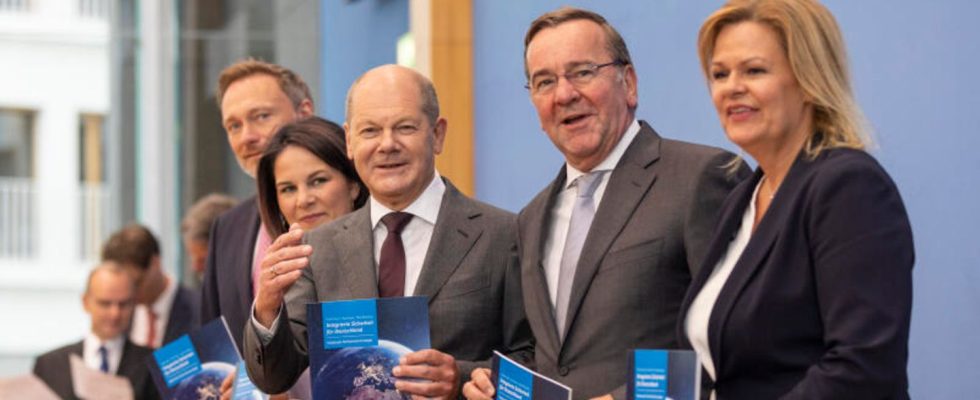“Integrated Security Policy”
From the military to infrastructure – the German government presents a national security strategist
There it is, the National Security Strategy. Finance Minister Christian Lindner, Foreign Minister Annalena Baerbock, Federal Chancellor Olaf Scholz, Defense Minister Boris Pistorius and Interior Minister Nancy Faeser present the policy paper (from left to right)
© Maja Hitij / Getty Images
Everything that endangers Germany from inside and outside – in summary: the first national security strategy for Germany comprises 40 pages. All players in the field of security should work together, all instruments should interlock.
After months of negotiations, the federal government has decided on a national security strategy for Germany for the first time. The cabinet approved the 40-page paper at its meeting in Berlin on Wednesday. Against the background of the Russian war of aggression in Ukraine and an increasingly aggressive Chinese government, the basic idea of the strategy is to take into account all internal and external threats to Germany’s security for the first time.
Chancellor Olaf Scholz (SPD), Foreign Minister Annalena Baerbock (Greens), Defense Minister Boris Pistorius (SPD), Finance Minister Christian Lindner (FDP) and Interior Minister Nancy Faeser (SPD) officially presented the strategy at a press conference.
It’s no longer just about defense and the Bundeswehr, “but about the whole range of our security,” emphasized Scholz. This includes diplomacy as well as the police, fire brigade, technical aid organizations, development cooperation, cyber security and the resilience of supply chains. “All of these resources and instruments must mesh and work together to strengthen our country’s security,” said the Chancellor.
Germany should become more independent, especially from China
According to the security strategy, all relevant policy areas and actors should be involved in order to make Germany resilient. This ranges from national and alliance defense to the protection of technical infrastructure, cyber and space security to raw material, energy and food security. Civil defense and civil protection, development policy, protection from outside influence and espionage, and dealing with the climate crisis and pandemics are also mentioned. The federal, state and local governments, business, science, civil society and the general public are to be involved.
In the security strategy, the federal government is also committed to NATO and the EU and to strengthening the Bundeswehr by investing two percent of economic output in defense on average over the long term. The free-democratic basic order should be defended against illegitimate influence, and dependency on raw materials and energy should be reduced by diversifying supply relationships.
Finance Minister Lindner emphasized that security also has a financial dimension. “Fiscal reserves in crisis situations mean having the ability to act,” said the FDP chairman. Under different circumstances, the corona pandemic and the energy price shock last year would have posed a significant threat to social peace – “if we hadn’t had the fiscal reserves to avert the destruction of livelihoods”.
Traffic light rules out formation of a National Security Council
The traffic light coalition decided not to set up the long-discussed National Security Council to coordinate government action. The added value of the various ideas was carefully considered “and no greater added value was recognized,” said Scholz. There is the Federal Security Council, which makes the relevant decisions. Baerbock referred to the good experiences with the security cabinet after Russia’s attack on Ukraine in February 2022. It has shown that in critical moments you can come together and make decisions in a spirit of trust. This will also be continued in the future.
Sometimes enemy, sometimes friend
Russia and China – Stations of an uncanny friendship
“For the foreseeable future, today’s Russia is the greatest threat to peace and security in the Euro-Atlantic region,” says the more than 70-page paper. And: “China is a partner, competitor and systemic rival.” The elements of rivalry and competition have increased in recent years. “China is trying in various ways to reshape the existing rules-based international order, increasingly aggressively claiming regional supremacy and repeatedly acting in contradiction to our interests and values.”

